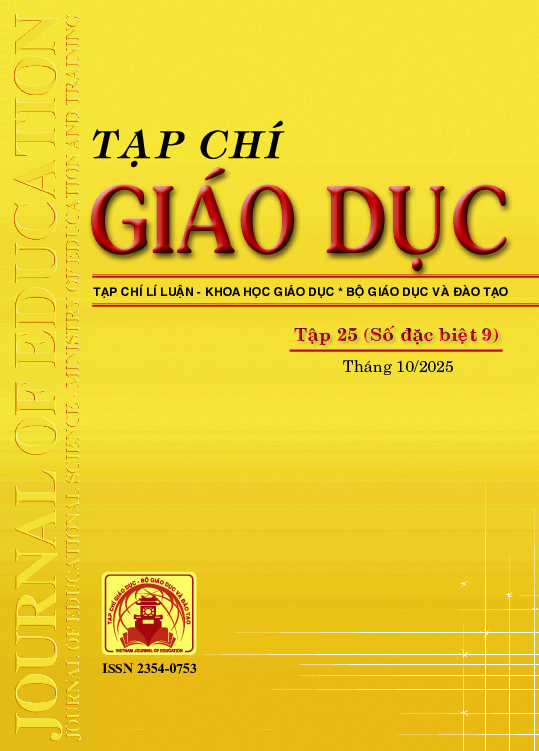Giáo dục tích hợp trong phát triển kĩ năng giải quyết vấn đề cho trẻ mẫu giáo 5–6 tuổi: Một số vấn đề lí luận
Tóm tắt
In the context of early childhood education reform oriented toward competence development, problem-solving skills constitute a core competency that must be fostered from an early age, particularly in preschool children aged 5–6 as they prepare for primary school. This study conceptualizes integrated education as a pedagogical approach that informs the entire process of designing, organizing, and assessing learning activities through cross-disciplinary connections and real-world applications, rather than merely treating it as a discrete organizational format. The article synthesizes theoretical foundations of integrated education and problemsolving, analyzes their interrelationship, and proposes a five-step framework for organizing integrated education activities aimed at promoting problemsolving skills in 5–6-year-old children. This framework offers flexible applicability in early childhood teaching practice, contributing to the comprehensive competency development of children in alignment with the objectives of the current early childhood education curriculum.
Tài liệu tham khảo
Brown, L. J. (1988). Helping children learn to solve problems. Day Care & Early Education, 16(2), 26-30. https://doi.org/10.1007/BF01622980
Bùi Hiền, Nguyễn Văn Giao, Nguyễn Hữu Quỳnh, Vũ Văn Tảo (2001). Từ điển Giáo dục hoc. NXB Từ điển Bách khoa.
Burleson, W. (2005). Developing creativity, motivation, and self-actualization with learning systems. International Journal of Human-Computer Studies, 63(4-5), 436-451. https://doi.org/10.1016/j.ijhcs.2005.04.007
Cao Thị Hồng Nhung (2020). Tổ chức hoạt động ngoài trời nhằm phát triển lời nói mạch lạc cho trẻ 5 - 6 tuổi ở trường mầm non. Đại học Sư phạm Hà Nội.
Chen, Y.-L., & Tippett, C. D. (2022). Project-Based Inquiry in STEM Teaching for Preschool Children. Eurasia Journal of Mathematics, Science and Technology Education, 18(4), em2093. https://doi.org/10.29333/ejmste/11899
Choudhar, S., Bi, N., Singh, P. N., & Talwar, M. P. (2022). Study on Problem Solving Skills and Its Importance. World Journal of English Language, 12(3), 47. https://doi.org/10.5430/wjel.v12n3p47
Dostál, J. (2015). Theory of Problem Solving. Procedia - Social and Behavioral Sciences, 174, 2798-2805. https://doi.org/10.1016/j.sbspro.2015.01.970
Erol, A., Erol, M., & Başaran, M. (2022). The effect of STEAM education with tales on problem solving and creativity skills. European Early Childhood Education Research Journal, 1-16. https://doi.org/10.1080/1350293X.2022.2081347
Hồ Sỹ Hùng (2022). Thực trạng phát triển tính sáng tạo của trẻ 5 - 6 tuổi thông qua tổ chức các hoạt động STEAM ở một số trường mầm non tỉnh Thanh Hoá. Tạp chí Khoa học, Trường Đại học Sư phạm Hà Nội, 67(4A), 12-21. https://doi.org/10.18173/2354-1075.2022-0089
Hoàng Thị Phương (2012). Giáo trình lí luận và phương pháp hướng dẫn trẻ làm quen với môi trường xung quanh. NXB Đại học Sư phạm.
Jamil, F. M., Linder, S. M., & Stegelin, D. A. (2018). Early Childhood Teacher Beliefs About STEAM Education After a Professional Development Conference. Early Childhood Education Journal, 46(4), 409-417. https://doi.org/10.1007/s10643-017-0875-5
Jonassen, D. H. (2004). Learning To Solve Problems- An Instructional Design Guide. 253. www.pfeiffer.com
Lindeman, K. W., Jabot, M., & Berkley, M. T. (2014). The role of STEM (or STEAM) in the early childhood setting. In L. E. Cohen & S. Waite-Stupiansky (Eds.), Learning Across the Early Childhood Curriculum (pp. 95-114). Emerald Group Publishing Limited. https://doi.org/10.1108/S0270-4021(2013)0000017009
Lile Diamond, L. (2018). Problem Solving in the Early Years. Intervention in School and Clinic, 53(4), 220-223. https://doi.org/10.1177/1053451217712957
Lim, H. J., & Byun, K. (2019). The impact of a STEAM education program on young children’s problem-solving ability and scientific attitude. Early Childhood Education Journal, 47(1), 1-9.
Mã Thanh Thuỷ, Nguyễn Thị Triều Tiên (2016). Hình thành kĩ năng giải quyết vấn đề cho trẻ mẫu giáo 5-6 tuổi thông qua trò chơi đóng vai theo chủ đề. Tạp chí Giáo dục, 374, 10-13.
Md, M. R. (2019). 21st Century Skill “Problem Solving”: Defining the Concept. Asian Journal of Interdisciplinary Research, 64-74. https://doi.org/10.34256/ajir1917
Ng, A., Kewalramani, S., & Kidman, G. (2022). Integrating and navigating STEAM (inSTEAM) in early childhood education: An integrative review and inSTEAM conceptual framework. Eurasia Journal of Mathematics, Science and Technology Education, 18(7), em2133. https://doi.org/10.29333/ejmste/12174
Nguyễn Thành Hải (2019). Giáo dục STEM/STEAM từ trải nghiệm thực hành đến tư duy sáng tạo. NXB Trẻ.
Nguyễn Thành Kỉnh (2010). Phát triển kĩ năng dạy học hợp tác cho giáo viên trung học cơ sở. Đại học Thái Nguyên.
Nguyễn Thị Ánh Tuyết, Nguyễn Thị Như Mai, Đặng Thị Kim Thoa (2003). Tâm lí học trẻ em lứa tuổi mầm non. NXB Đại học Sư phạm.
Nguyễn Thị Hoà (2010). Giáo trình giáo dục tích hợp ở bậc học mầm non. NXB Đại học Sư phạm.
Nguyễn Văn Biên, Tưởng Duy Hải (chủ biên, 2019). Giáo dục STEM trong nhà trường phổ thông. NXB Giáo dục Việt Nam.
Piaget, J. (1936). Origins of intelligence in the child. London: Routledge & Kegan Paul.
Đã Xuất bản
Cách trích dẫn
Số
Chuyên mục
Giấy phép

Tác phẩm này được cấp phép theo Ghi nhận tác giả của Creative Commons Giấy phép quốc tế 4.0 .












